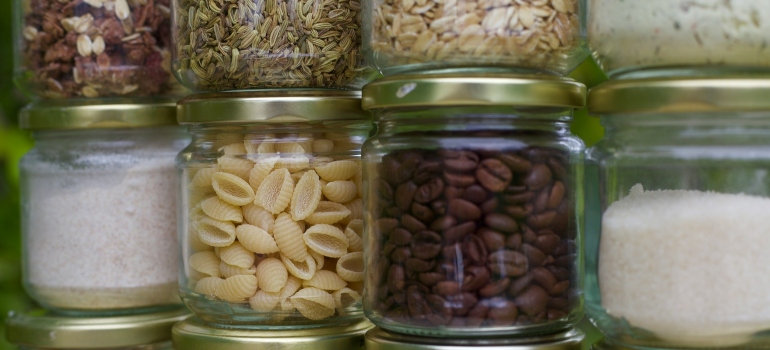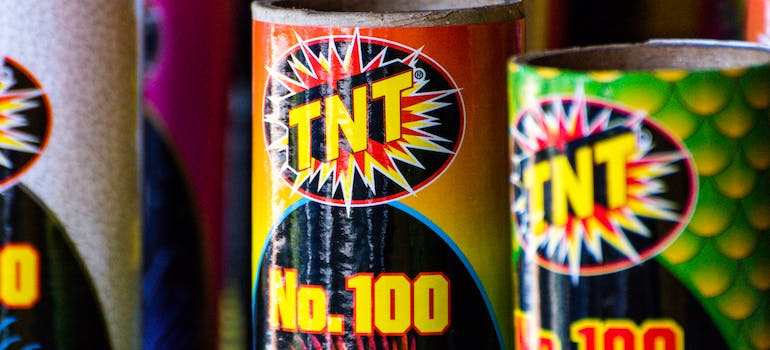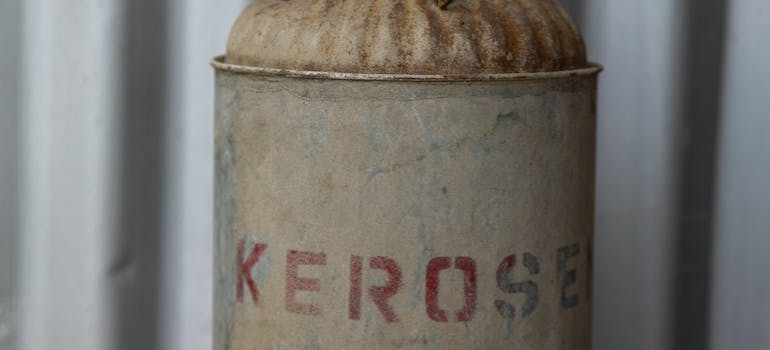The What and Why of Things You Cannot Store
When it comes to storing your belongings, understanding what items are off-limits is essential. Knowing about restrictions and why certain items are banned can help you make informed decisions. It is also vital for ensuring the safety and integrity of your possessions, as well as the storage facility. So, let your Boise moving and storage experts uncover the what and why of things you cannot store, and make sure your storage choices are as smart and secure as possible.
Key Prohibited Items in Storage Units
When preparing items for storage, it’s important to know what’s not allowed. This list helps you avoid storing prohibited items, ensuring your storage practices are safe and legal:
- Perishables and Food: This includes all food items, both perishable and non-perishable, to prevent spoilage and pest infestation.
- Hazardous Materials: Such as gasoline, propane, chemicals, and paint.
- Stolen and Illegal Goods: Any items obtained illegally.
- Weapons and Ammunition: All types of firearms and explosives.
- Biological Materials: Living organisms, including plants and animals, and decomposing organic matter.
- Wet Items: Items that are damp or wet to prevent mold and water damage.
- Drugs: Illegal substances and certain prescription medications.
- Lithium Batteries: Due to their potential fire hazard.
- Explosives: All forms of explosive materials.
- Flammable Liquids: Such as fuels, oils, and certain alcohols.
- Combustible Chemicals: Chemicals that can ignite or react dangerously.
- Toxic Materials: Substances harmful to health or the environment.
This list ensures your storage unit remains a safe and compliant space for your belongings. Avoiding these items is key to a trouble-free storage experience.
Food and Perishables
Storing food in a storage unit poses significant risks. Perishable items like fruits, vegetables, and dairy products can spoil quickly, leading to unpleasant odors. Even non-perishable items can attract pests such as rodents and insects. These pests not only damage your stored items but can also become a widespread problem for the storage facility. Additionally, food remnants can lead to mold growth, further contaminating the storage environment.

Hazardous Materials
Hazardous materials, including flammable liquids, chemicals, and gases like propane, pose serious risks in storage units. These substances can easily ignite, causing fires that may lead to significant property damage and endanger lives. Additionally, the storage of such materials often violates legal regulations, potentially leading to legal liabilities for the renter. The confined space of a storage unit amplifies these dangers, making it crucial to keep hazardous materials out for everyone’s safety.
Stolen and Illegal Goods
Storing stolen or illegal goods in a storage unit is not only unethical but also illegal. It can lead to serious legal consequences, including fines and imprisonment. Storage facilities are not immune to law enforcement inspections, and if illegal items are found in your unit, you could be held responsible. This policy helps deter criminal activities and ensures that storage facilities are not used for unlawful purposes.
Weapons and Ammunition
Weapons and ammunition are generally prohibited in storage units due to safety concerns. The risk of accidental discharge, theft, and misuse is high, especially in facilities without stringent security measures. Additionally, storing these items can lead to legal issues, as different regions have varying laws regarding the storage of firearms and ammunition. For these reasons, it’s advisable to find alternative, secure storage solutions for such items.
Biological Materials
Biological materials, such as plants, animals, and any organic matter capable of decomposition, are unsuitable for storage units. Plants and animals need specific living conditions, which storage units cannot provide. Moreover, deceased organic matter is among things you cannot store as it decomposes, leading to unpleasant odors and attracting pests. The presence of such materials can also pose health risks due to potential mold growth and allergens. Units for inventory storage are designed to house inanimate objects, and the introduction of biological materials disrupts this environment, leading to potential damage and health hazards.
Wet Items
Storing damp items in a storage unit is a recipe for trouble. Moisture can lead to mold growth, which not only damages the stored items but also poses health risks. Mold thrives in dark, damp environments, making storage units particularly susceptible. Additionally, wet items can cause water damage to the unit itself and to neighboring units, potentially leading to costly repairs. To prevent these issues, it’s crucial to ensure that all items are completely dry before storage and to consider using moisture absorbers or dehumidifiers in the unit.
Drugs and Certain Prescription Medications
The storage of drugs, especially illegal narcotics, in storage units is strictly prohibited. This includes both illicit substances and certain prescription medications that may be subject to misuse. The presence of drugs can attract criminal activity, putting the storage facility and its users at risk. Additionally, storing drugs can lead to serious legal consequences, including fines and imprisonment. Even legal medications might be among things you cannot store, considering the potential for temperature fluctuations and unauthorized access in storage units.

Lithium Batteries
Lithium batteries are known for their efficiency and power, but they pose significant fire risks, especially when damaged or stored improperly. In the confined space of a storage unit, a fire caused by lithium batteries can escalate quickly, endangering the entire facility. The risks are heightened due to the potential for thermal runaway, a process where increasing temperature leads to further heat release. For these reasons, storage facilities often prohibit lithium batteries to prevent fire hazards and ensure the safety of all stored items and the facility itself.
Explosives
Explosives, including fireworks, gunpowder, and other explosive compounds, are strictly prohibited in storage units due to their high risk. The potential for accidental detonation poses a severe threat to property and personal safety. In addition to the immediate physical danger, the legal ramifications of storing explosives can be severe. Storage facilities are not equipped with the necessary safety measures to handle such materials, making their storage both dangerous and irresponsible.
Flammable Liquids
Flammable liquids, such as gasoline, kerosene, and certain alcohols, are not allowed in storage units due to their high fire risk. These substances can easily ignite, causing rapid fire spread in a confined space. The storage of flammable liquids also often violates fire safety regulations, leading to potential legal issues for the renter.
Volatile Chemicals
Flammable chemicals, including certain industrial solvents and aerosols, pose significant fire and explosion hazards. When stored improperly, these substances can react unpredictably, potentially leading to fires or chemical spills. The confined space of a storage unit can exacerbate these dangers, making it essential to keep such chemicals out of storage facilities.
Toxic Materials
Toxic materials, such as certain pesticides, herbicides, and asbestos-containing materials, are hazardous to both human health and the environment. Storing these substances in a storage unit can lead to accidental exposure or contamination. The risks associated with handling and storing toxic materials require specialized procedures and facilities, which typical storage units do not provide. Therefore, to prevent health hazards and environmental damage, toxic materials are specified as things you cannot store in these units.
Additional Considerations: Jewelry and Important Documents
While not prohibited, storing jewelry and important documents in storage units requires careful consideration. For jewelry, the primary concern is security, as storage units may not offer the same level of protection as a bank’s safe deposit box. For important documents, the risk lies in potential damage from environmental factors like humidity or pests. Using protective measures such as waterproof and fireproof containers is advisable to safeguard these valuable items.

Detailed Safety Tips for Storing Allowed Items
Ensuring the safety and preservation of your stored items involves careful planning and organization. Start by selecting the right unit for your needs, especially considering climate control for sensitive items like electronics, artwork, or wooden furniture. This protects them from damage due to temperature fluctuations and humidity.
When packing, use sturdy boxes and quality packing materials. Wrap fragile items individually and ensure that boxes are not overfilled to prevent damage. Proper labeling of boxes with contents and handling instructions is crucial for easy identification and careful handling.
Organize your unit thoughtfully. Place heavier items at the bottom to prevent collapsing, and arrange items cleverly so that those you need frequently are easily accessible. Leave a walkway within the unit for easy navigation and to avoid any accidental damage when retrieving items.
Legal Considerations in Storage Unit Usage
Managing the legalities of storage unit rental is key to a hassle-free experience. The rental agreement is your guide here, detailing terms of use, payment schedules, and policies regarding late payments or unit abandonment. Understanding these terms helps avoid any future misunderstandings or conflicts.
Insurance is another critical aspect. Many storage facilities require insurance for the items stored. Check whether your existing homeowner’s or renter’s insurance extends to storage units or if you need a separate policy. This ensures compensation in case of theft, damage, or other unforeseen circumstances.
Be aware of the consequences of rule violations. Reputable storage units in Boise have policies in place for a reason, and violating these can lead to penalties ranging from fines to legal action. Familiarize yourself with the rules on things you cannot store and adhere to them to maintain good standing with the facility.
Maintenance and Regular Checks of Your Storage Unit
Regular maintenance and checks of your storage unit are essential for the long-term safety and condition of your stored items. Plan periodic visits to your unit to inspect for any signs of damage, pest infestation, or water leakage. These checks can prevent minor issues from becoming major problems.

During these visits, also take the time to reorganize your unit if necessary. Keeping the space tidy and items well-arranged not only makes accessing your belongings easier but reduces the risk of accidental damage, too. Also, ensure that the unit’s lock is secure and functioning properly each time to safeguard your items.
Alternative Storage Solutions for Prohibited Items
Safe storage of items prohibited in standard units requires a combination of creativity and awareness of available options. Here’s a guide to alternative solutions that ensure the safety and legality of storing these special categories of items:
- Valuable Jewelry and Precious Metals: For items like expensive jewelry, heirlooms, or precious metals, a safe deposit box at a bank offers enhanced security. Banks provide a highly secure environment, typically with advanced safety features like biometric scanners, surveillance, and alarm systems, ensuring your valuables are protected against theft and damage.
- Hazardous Materials: For items like paint, chemicals, or gasoline, specialized storage facilities are the go-to solution. These facilities are equipped with the necessary safety measures to handle hazardous materials, including proper ventilation, fire safety systems, and secure containment areas. Look for facilities specifically designed for chemical or industrial storage.
- Weapons and Ammunition: Firearms and ammunition require secure storage that complies with local laws and regulations. Consider using dedicated gun safes in your home or renting a locker at a gun club or shooting range. These places often provide the appropriate security measures and are knowledgeable about legal compliance.
- Biological Materials: For items like live plants, certain biological samples, or agricultural products, consider storage solutions offered by specialized agricultural storage facilities or botanical gardens, research facilities, or universities. These options provide the necessary conditions and care to maintain the quality and viability of such materials.
Explore these alternative storage solutions and ensure that your valuable and sensitive items are stored in environments that cater specifically to their needs. It offers you peace of mind and ensures compliance with legal and safety standards.
The Power of Knowledge in Protecting Your Possessions
Understanding storage intricacies extends beyond knowing what things you cannot store. It emphasizes the importance of informed decision-making. Thorough research, continuous learning, and consulting with experts are crucial in making the right storage choices. These steps enable you to make choices that protect your belongings and ensure compliance with legal and safety standards. In storage, knowledge is indeed power, providing security for your possessions and peace of mind.

Everyone from the packers to the movers were awesome! They were all very professional and showed up when they were supposed to. would definitely use them again.

